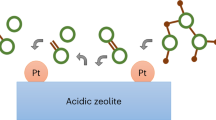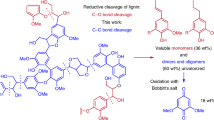Abstract
Liquefaction of coal requires thermal rupture of its carbon–carbon bonds to form free-radical fragments. Before these radicals can recombine or polymerize they must be stabilized by hydrogen atoms usually supplied by a hydrogen-donating solvent or by gaseous hydrogen. The conditions required for such liquefaction reactions are usually temperatures ≳400 °C and hydrogen pressures of several hundred atmospheres1,2. Often catalysts can be used to accelerate the breaking of carbon–carbon bonds and the transfer of hydrogen. Ouchi et al.5 reported that p-toluenesulphonic acid catalysed the depolymerization of coal. Darlage and Bailey6 investigated various solvents and Friedel–Crafts catalysts and found that repolymerization of the coal radical fragments was a predominant reaction when coal liquefaction was conducted in non-phenolic solvents such as toluene, xylene or tetralin. Heating coals in phenol at 425 °C was reported7 to cause extensive depolymerization accompanied by rearrangement of hydrogen to form a hydrogen-rich soluble fraction and a hydrogen-poor insoluble fraction. We now report that bituminous coal can be depolymerized at 300 °C by using, instead of phenol, the abundant, renewable raw material lignin which is a major component of all vascular plants. When a mixture of coal and lignin is reacted in a solvent in the presence of an acid catalyst both the coal and the lignin depolymerize in relatively mild conditions to form a filterable liquid product. The presence of the lignin increases substantially the amount of the coal that can be so liquefied.
This is a preview of subscription content, access via your institution
Access options
Subscribe to this journal
Receive 51 print issues and online access
$199.00 per year
only $3.90 per issue
Buy this article
- Purchase on Springer Link
- Instant access to full article PDF
Prices may be subject to local taxes which are calculated during checkout
Similar content being viewed by others
References
Shah, Y. T. & Cronauer, D. C. Catal Rev. Sci. Engng. 20, 209 (1979).
Neavel, R. C.Fuel 55, 237 (1976).
Wen, C. Y. & Tone, S. Am. chem. Soc. 56, 156 (1978).
Tsai, M. C. & Weller, S. W. Fuel Proc. Technol. 2, 313 (1979).
Ouchi, K. I., Imuta, K. & Yamashita, Y. Fuel 43, 24 (1964).
Darlage, L. J. & Bailey, M. E. Fuel 55, 205 (1976).
Larsen, J. W., Soms, T. L. & Rodgers, B. R. Fuel, 60, 335 (1981).
Conners, W. J., Johanson, L. N., Sarkanen, K. V. & Winslow, P. Holzforschung 34, 29 (1980).
Oshima, M., Kashima, K., Tabata, T. & Watanabe, H. Bull. chem. Soc., Jap. 39, 2750 (1966).
Goheen, D. W. Adv. Chem. Ser. 59, 205 (1966).
Goheen, D. W. in Lignin Occurrence, Formation, Structure and Reactions (eds Sarkanen, K. V. & Ludwig, C. H.) 797 (Wiley, New York, 1971).
Schuman, S. C. & Field, S. Canadian Patent, 851, 709 (1972).
Wiser, W. H. DOE Symp. Ser. 46, 219 (1978).
Vernon, L. W. Fuel 59, 102 (1980).
Author information
Authors and Affiliations
Rights and permissions
About this article
Cite this article
Coughlin, R., Davoudzadeh, F. Lignin depolymerizes coal at 300 °C. Nature 303, 789–791 (1983). https://doi.org/10.1038/303789a0
Received:
Accepted:
Issue Date:
DOI: https://doi.org/10.1038/303789a0
This article is cited by
-
Study on the mechanism of coal liquefaction reaction and a new process concept
Journal of Coal Science and Engineering (China) (2008)
Comments
By submitting a comment you agree to abide by our Terms and Community Guidelines. If you find something abusive or that does not comply with our terms or guidelines please flag it as inappropriate.



